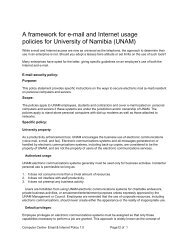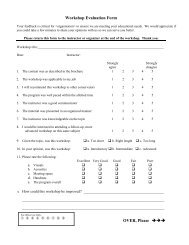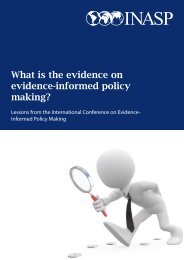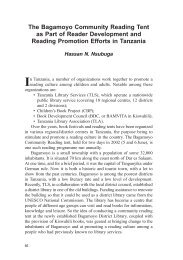INASP newsletter 49.pdf
INASP newsletter 49.pdf
INASP newsletter 49.pdf
Create successful ePaper yourself
Turn your PDF publications into a flip-book with our unique Google optimized e-Paper software.
Therefore an important aspect to consider within suchprogrammes is the development of an explicit Theory ofChange that clearly represents an overall vision of success,including its preconditions and the link between differentinterventions that could strengthen evaluation and learning.However, this should not be an overly structured, preprogrammedapproach that would have been doomed tofailure in the dynamic and complex environments wheretraining usually takes place.Q4. After carrying out the evaluation, you took part in asimilar programme as a participant. Did your perspectiveof the programme change once you had experienced it foryourself?No, not really. After I carried out the evaluation I was veryintrigued and enthusiastic to participate as a trainee sinceall the African participants had been very excited about thetraining. It helped me to tie things together and completelyunderstand why the reaction of the interviewees was sopositive. To start by acknowledging what participants alreadyknew and brought to the workshop was a key element tomake the learning process more interesting, appealingand worthwhile. Furthermore, I have participated in othertraining and also delivered some but I learned on this onemany tactics to make the most of time, to use every singlesecond available and still keep participants engaged – whichis not easy in such an intense workshop.Another outstanding aspect was that the training wasexplanatory; the way it was delivered was a way of teachinghow we should deliver our own training. Consequently, itis not surprising that participants feel they have learnedand acquired new skills. However, I am concerned aboutthe sustainability of this knowledge and the achievementof behavioural change. One of the conclusions andrecommendations we arrived at in the evaluation was theimportance of having some kind of follow-up system withtrainees. Mentoring or continuous learning are neededin order to develop and ground this type of change.Notwithstanding, I am aware this is what people workingin capacity building usually struggle with, unfortunatelyresources are scarce!Q5. What (if anything!) did you learn by participating inthe programme? Do you think it will change how you willapproach training in the future?It is very common to believe that if someone dominatesa topic there is a high chance they will deliver trainingsuccessfully. In some way, I believed that before participatingin the training. However, I have to say that by the way theprogramme was designed it shows that <strong>INASP</strong> and IDS havethought of the many things that an “expert” has to dealwith while carrying out training and I completely changedmy opinion about expertise and training! Among the thingsthat can go wrong include facing questions trainers don’treally know how to answer and/or dealing with difficultparticipants. These specific examples made us realise that itdoesn’t matter how much we know about a topic, the waywe relate and communicate with our audience will bringdifferent outcomes.Another aspect I think was key, was the fact that when wetrain people it is fundamental to first acknowledge whatparticipants bring to the table, give them a chance to saywhat they already know and build up the training fromthere. If trainers working in capacity building are able toincorporate this last aspect in their programmes I believecapacity development would improve considerably! I thinkwe need to really invest in training our trainers in effective,learner-centred pedagogical approaches.Q6. Now that you have evaluated one programme andparticipated in another, do you have any particularconcerns or anxieties about delivering the sameprogramme in Latin America? What do you imagine will bethe biggest challenges?The importance of working directly with the “demandside” is growing enormously in Latin America but it is still achallenge. Up until now training has been delivered mainlyto members of organisations that wanted to influencepolicy. Consequently, there has been significant changein the way researchers approach their investigations andpublic policies, the consciousness of the use of evidence inpolicymaking has risen considerably. However, in the last fewyears the “demand side” has been targeted as an audiencethat should also receive training for better policymaking.Therefore, training on pedagogical skills comes at a perfecttime and it will be very much appreciated since dealing withpolicymakers in Latin America is a tussle and trainers needto improve their skills to deal with this type of audience.Moreover, we know context is fundamental, therefore aconstructivist approach will be key to implement this training,our challenge is to recognise what is the previous knowledgeparticipants have and incorporate it in the workshop. I think(and I hope!) this kind of workshop will boost local trainingand make engagement with policymakers a more commonpractice in the region.This interview was originally posted on our blog,Practising Development, on 20 July, 2012.http://bit.ly/VCM5ui<strong>INASP</strong> Newsletter 49 December 201211








